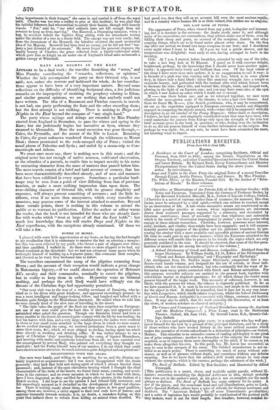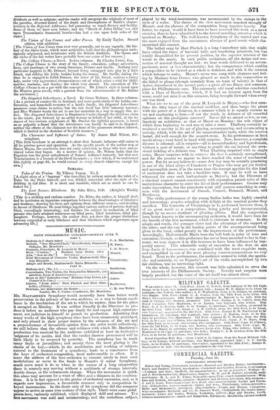PUBLICATIONS RECEIVED.
from June 6th to June 12th.
BOOKS.
A Residence at the Court of London; comprising Incidents, Official and Personal, from 1819 to 1825: among the former, Negotiations on the Oregon Territm7, and other Unsettled Questions between the United States and Great Britain. By Richard Rush, Envoy Extraordinary and Minister Plenipotentiary from the United States during the above years. Second series. In twovolames.
.Days and Nights in the East. From the original Notes of a recent Traveller through Egypt, Arabia Petrma, Turkey, and Greece. By Miss Plumley. The White Stare; or the Russian Peasant Girl. By the Author of "Reve-
lations of Russia." In three volumes.
Charicies; or Illustrations of the Prive'te Life of the Ancient Greeks: with Notes and Excursus. Translated from the German of Professor Becker, by
the Reverend Frederick Metcalfe, MA., Fellow of Lincoln College Oxford.[Charicles is a novel of customs rather than of manners; for manners, College, chas, racter, must be animated by a vital spirit,—which can seldom be reached except by an observation of life. A tale whose successive scenes are constructed to ex., habit some peculiar practice or custom, whose representations are inferences drawn from scattered passages supported by a reference, and dovetailed by laborious contrivance, must of necessity want that wholeness and animation which is the result of "observation impregnated by genius"; nor does genius often engage in these minute researches. Chancles, however, possesses more interest, story, incident, and vitality, than might have been supposed; and it will uncineese tionably answer the purpose of the author and his judicious translator, by pre- senting the student with a more available and agreeable picture of ancient Grecian life than he could gain 'in any other manner; whilst the Excursus attached to the different scenes will enable him to pursue in its details the topics which are only generally exhibited in the text. It should be observed, that some of the free pecu- liarities of ancient life are among the subjects of the volume.] A School Dictionary of Greek and Roman Antiquities. Abridged from the larger Dictionary. By William Smith, LL.D.,Editor of the Dictionaries of "Greek and Roman Antiquities," and " Biography and Mythology." [An abridgment from Dr. Smith's larger Dictionary, compressed into a mo- derate-sized handy volume, and designed for the use of schools, or those indi- viduals who are not classical scholars, but who continually feel the want of in- formation upon many points connected with Greek and Roman antiquities. For this purpose, recondite subjects are omitted in the present book, together with subordinate matter or disputed questions; for all which things the reader mast possess himself of the larger work. This necessity of reference, however, is not likely, with the persons for whom the volume is expressly published. So far as we have examined it, it is neat in its compression, and ample in its information for the object in view. It should be remarked, that it does not in any way inter- fere with Lempriere which chiefly relates to persons, whilst the School Dictionary of Greek and Roman Antiquities is concerned with things customs, and institu- tions. It may also be added that the work embodies the discoveries, or at least the views, of modern scholar's on classical antiquity.] The Causes and Consequences of National Revolutions among the Ancients and the Moderns Compared; a Prize Essay, read in the Sheldonitat Theatre, Oxford, 4th June 1815. By Samuel Lucas, BA., Queen's Col- lege, Oxford. [This is a clever and painstaking prize essay, by a candidate who has well pre- pared himself for his task by a perusal of the principal historians, and by a study of those writers who have treated history in the more critical manner which makes the narrative of events subordinate to a deduction of principles—as Guizot, Hellen). This stimulus to an extensive course of reading and inquiry is one great use of prize compositions: another is a dissection of the subjects the student has acquired, so as to impress them more thoroughly on his mind, if he cannot as yet make them altogether his own. In this point, too, Mr. Lucas has succeeded; as may be seen in the synopsis of his essay. The finished manufacture is not en- titled to so much praise. There is something too much of pomp without sttb-k stance, as well as of phrases without depth, and sometimes without any definite meaning. Nor do we know that the author's drift would always be very clear without the synopsis; which is the essence, perhaps the substance of the work.] The Book of Ballads. Edited by Bon Gaultier; and illustrated by Alfred
Crowquill.
[This publication is a smart, clever, and readable satiric parody, without ill- nature; somewhat resembling the Rejected Addresses in idea, though probably they were not in the author's mind, as his plan is not so complete nor his mark always so distinct. The Book of Ballads -has many subjects for its satim A few of the pieces, and the occasional head and tail illuminations, point to Lock- hart's Spanish Ballads; others have a spice of ridicule for German sentiment and. diablerie. The "American Ballads" hit off some Transatlantic peculiarities; and a series of ingenious lays would probably be used instead of the poetical pita they imitate, were it not for their length. Bon °flakier, however, touches in-
clividuals as well as subjects; and the reader will recognuM the originals of most of the parodies, divested indeed of the depth and thoroughness ofSmith's charac- teristics in the Rejected Addresses, but as much fluency and facility. Some of them we have seen before; an the " oath of Jabez Dollar"—a skit upon Transatlantic Senatorial brawls—has had a run upon both sides of the water.] The Vision of Las Casas; and other Poems. By Emily Taylor. Second edition, with additions. [The Vision of Las Cases runs over very generally, not to say vaguely, the his- tory of the Slave-trade, which most authorities hold that the philanthropist unde- ta,gneclly originated, and terminates with the British Abolition. The theme awl the views of the fair writer have probably been one cause of her success.]
The College Chums; a Novel In two volumes. By Charles Lister, Esq. [The College Chums is the story of the family, education, college adventures, Fov.a. , and marriage, of two young Oxonians Dormer and Saville. Nothing very particular happens to Mr. Dormer,. beyond being entrapped into play by .a false Mend, and risg his bride besides lasing his money. Mr. Saville, during the time 10e is engaged to Edith' Dormer, the sister of his friend, seduces a young lady, under very aggravated circtunserinces; out of which arises a trial for child- murder, madness, and deaths; the whole very absurd. The execution of The College Chums is on a par with the conception. Mr. Lister's style is based upon the Minerva press novels, with a garnish from the advertisements of Mr. Robins the auctioneer.]
The Disputed Inheritance; a Novel. By Grace Webster. In three volumes. [As a picture of country life in Scotland, and more particularly of the habits, con- versation, and household economy of a laird's family, the Disputed Inheritance possesses some claims to notice, but the tale itself has little inherent interest; and Miss Webster wants the art to use her materials in a way to supply this de- fect. The Disputed Inheritance is Dundauvie Castle; though the fictitious claim to the estate, put forward by an artful woman on behalf of her child, at the in- stance of two envious neighbours of Mr. Dunbar the rightful possessor, is based on so palpable a fraud that the inheritance can hardly be said to be disputed : neither the efforts of the claimant nor the fears of the possessors awaken interest, which is limited to the sketches of Scottish manners.] The Character and Influence of Satan. By James Hall Wilson, Bir- mingham.
[This little brochure is an attempt to show that Satanic influence still exists in all its pristine power and operation. As the specific proofs of the author stop at Simon Magus' the conclusion does not carry. conviction to those who were uncon- vinced betoretbey began. As a matter of opinion, Mr. Wilson holds that the Popedom was the great embodiment of Satanic influence formerly, but that now Tractarianism is a-branch of the Devil incarnate; a view which, if we understand him rightly at page 83, he would extend to every church whatever, except his own.]
SERIALS.
Mks of the Trains. By Tilbury Tramp. No. I. [A slight story of a " baginan " who travelling by railway mistook the valet of a Duke for the Duke himself, and was diddled somewhat after the style of the diddling in Gil Bias. It is short and readable, which are as much as can be looked for.] The Lost Senses: Blindness. By John Kitto, D.D. (Knight's Weekly Volume.) (This is a striking and curious number. Dr. late, the author, is himself deaf;" and he institutes an ingenious comparison between the disadvantages of blindness and deafness; drawing his facts and opinions from different sources, and deciding in favour of blindness. He next brings together various notices of persons deafen blind, exceedingly interesting; and finishes his subject by memorials of blind
who have attained eminence—as blind poets, blind musicians, blind phi- Crog:rs. Perhaps, however, the author does not draw the proper distinction between congenital 9r early blindness and that blindness which supervenes upon :advancing life.]



























 Previous page
Previous page